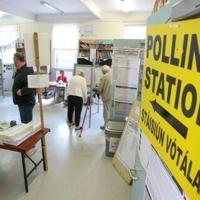Slovakia began its polling stations for EU-wide elections on Saturday, following the recent shooting incident involving Prime Minister Robert Fico last month.
This marked the midpoint of the four-day elections taking place across the EU to select the next European Parliament.
Most of the EU’s 27 countries, including major players like Germany and France, will hold their elections on Sunday.
Italy, the third-largest economy in the EU, will start voting later on Saturday, with the outcome likely to have significant implications for the Parliament’s composition and the future direction of the bloc.
In Slovakia, the attempted assassination of Fico on May 15 by a 71-year-old poet shocked the nation of 5.4 million and reverberated throughout the EU.
Fico, visibly slimmer post-attack, released a video ahead of the polls where he referred to his assailant as “an activist of the Slovak opposition” engaging in “aggressive and hateful politics”.
The incident, highlighted by his party in their campaign events, raised issues around EU arms deliveries to Ukraine and criticized alleged “warmongers” in Brussels.
Violence also erupted elsewhere in the EU.
On Friday, in Copenhagen, a man assaulted Danish Prime Minister Mette Frederiksen in a public square. She sustained minor injuries, and the assailant was apprehended by the police. Denmark also holds its elections on Sunday.
The President of the EU Commission, Ursula von der Leyen, condemned the attack on Frederiksen as a “despicable act”.
However, the shooting of Fico before the polls was the most significant incident in the EU ahead of the elections.
In the aftermath, support for Fico’s left-wing populist Smer-SD party surged, overtaking its main liberal rival in voter-intention surveys.
Historically, Slovakia has low turnout in EU elections, with only 22 percent of voters participating in the last election in 2019.
– Meloni, queenmaker? –
Attention will shift to Italy’s election later on Saturday. Far-right Prime Minister Giorgia Meloni hopes for a strong showing from her party to increase her influence as a key EU power player.
Polls indicate that her post-fascist Brothers of Italy party could lead with 27 percent of the vote, reflecting a broader surge in gains for far-right parties across the EU.
Meloni could potentially play a critical role in shaping the future of the EU, as her support may determine the re-election of current Commission lead von der Leyen.
Meloni has been sought after by other right-wing leaders, like Marine Le Pen, in forming a far-right alliance within the EU.
The outcome could help solidify Meloni’s control over Italy’s tumultuous political landscape.
Increasing anti-immigrant sentiment has boosted far-right parties across the EU, contributing to Meloni’s rise to power in 2022.
Overall, pre-election polls suggest that far-right parties may secure a quarter of the seats in the upcoming EU parliament.
In the Netherlands, where elections took place on Thursday, the anti-immigration party led by Geert Wilders secured the second spot in the new government coalition, according to exit polls.
The stronger-than-expected performance of pro-European parties in the Netherlands offers hope to centrists aiming to counter a surge in far-right support.
The European People’s Party and the Socialists and Democrats remain on track to be the top two groupings in the EU parliament.
del-rmb/ach





